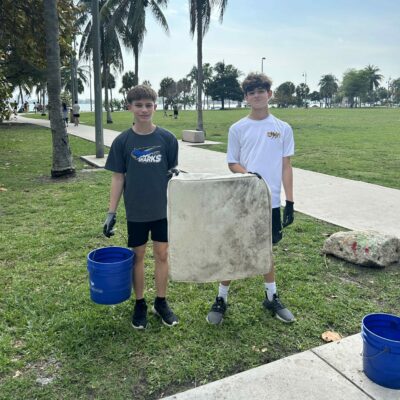Monthly Margaret Pace Cleanup
Miami, Florida
March 9, 2024
Overview
On Saturday, March 9th, The International SeaKeepers Society hosted a cleanup at Margaret Pace Park! We were joined by 27 volunteers this morning who set out to collect as much trash from the park as possible, covering the entire grassy lawn and rocky shoreline.Throughout the cleanup, our volunteers brought back endless bags and buckets full of trash, including some odd finds like a baby doll, a Croc sandal, and what looked to be part of a car’s sunroof. Our volunteers collected a total of about 130 pounds of trash, and by doing so are preventing it from entering Biscayne Bay and becoming marine debris that threatens the livelihood of our local wildlife. The most common items found during this cleanup were plastic fragments, bottle caps, and cigarette butts. These types of litter are usually the most frequently found items at our cleanups, and their size makes them more tedious to collect. We are grateful to all the volunteers who joined us this weekend, and we hope to see them at our next cleanup.
Outing Goal
Marine Debris Tracker is a data collection app that allows the general public to contribute to an open-date platform and scientific research by recording the different types of litter, specifically plastic pollution, that they find in either inland or marine environments. Marine Debris Tracker was developed by the University of Georgia’s Jambeck Research Group, which SeaKeepers worked with in 2021 when the Jambeck Research Group collaborated with Ocean Conservancy to assess Miami’s plastic waste management, known as a Circularity Assessment Protocol. SeaKeepers again assisted the Jambeck Research Group’s Circularity Informatics Lab in 2022 with another Circularity Assessment Protocol in the Florida Keys. The researchers of the Jambeck Lab use the Marine Debris Tracker app to record their data, and with citizen scientists also using the app, more data can be collected in different areas. Using Marine Debris Tracker at our cleanups involves community members in creating a bigger picture of plastic pollution, and provides the means for new scientific findings to be generated as well as for effective local legislation to be informed. SeaKeepers is excited to be incorporating this app at our cleanups and continue our mission of coastal education, protection, and restoration. In this cleanup, 74% of volunteers participated in using the app to record data.


You must be logged in to post a comment.